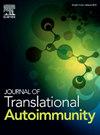通过微生物免疫调节和表观遗传控制重新定义多发性硬化治疗
IF 3.6
Q2 IMMUNOLOGY
引用次数: 0
摘要
多发性硬化症(MS)是一种慢性自身免疫性疾病,以免疫驱动的脱髓鞘和中枢神经系统的神经变性为特征。本综述探讨了MS的免疫学、分子和表观遗传学基础,强调T和B细胞的参与,信号通路失调(如TGF-β、Akt、Wnt),以及细胞死亡在疾病进展中的作用。表观遗传机制,如DNA甲基化和组蛋白修饰,进一步调节免疫反应。虽然目前的治疗方法广泛抑制免疫,但新兴的方法,包括工程细菌,基于微生物组的干预和细胞治疗,提供了靶向免疫调节和神经保护。总之,这些策略为下一代MS治疗指明了一条更精确、更有效的道路。本文章由计算机程序翻译,如有差异,请以英文原文为准。
Redefining multiple sclerosis therapy through microbial immunomodulation and epigenetic control
Multiple sclerosis (MS) is a chronic autoimmune disorder marked by immune-driven demyelination and neurodegeneration in the central nervous system. This Review explores the immunological, molecular, and epigenetic underpinnings of MS, emphasizing T and B cell involvement, dysregulated signaling pathways (e.g., TGF-β, Akt, Wnt), and the role of cell death in disease progression. Epigenetic mechanisms—such as DNA methylation and histone modifications, further modulate immune responses. While current therapies broadly suppress immunity, emerging approaches, including engineered bacteria, microbiome-based interventions, and cell therapies, offer targeted immune modulation and neuroprotection. Together, these strategies illuminate a path toward next-generation MS treatments with improved precision and efficacy.
求助全文
通过发布文献求助,成功后即可免费获取论文全文。
去求助
来源期刊

Journal of Translational Autoimmunity
Medicine-Immunology and Allergy
CiteScore
7.80
自引率
2.60%
发文量
33
审稿时长
55 days
 求助内容:
求助内容: 应助结果提醒方式:
应助结果提醒方式:


